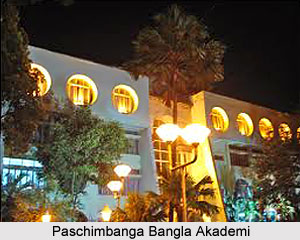 Paschimbanga Bangla Akademi was established on 20th May 1986. Since its inception Akademi has been functioning in pursuit of excellence in different spheres of the language and culture of the Indian state of West Bengal. There are three auditoria in the two centres of Akademi. These are - "Akademi Sabhaghar," "Jibanananda Sabhaghar" and `Rabindra- Okakura Bhavan`. At present these auditoria are becoming centres of art and Literature. The main functions of the Akademi are:
Paschimbanga Bangla Akademi was established on 20th May 1986. Since its inception Akademi has been functioning in pursuit of excellence in different spheres of the language and culture of the Indian state of West Bengal. There are three auditoria in the two centres of Akademi. These are - "Akademi Sabhaghar," "Jibanananda Sabhaghar" and `Rabindra- Okakura Bhavan`. At present these auditoria are becoming centres of art and Literature. The main functions of the Akademi are:
* Regular Publication of Dictionary and other Reference Books.
* Publication of Biography and anthology of different walks of life.
* Publication of writing of Manik Bandyopadhyay, Kazi Nazrul Islam and others
* To confer awards like Rabindra - Vidyasagar - Bankim Memorial Prizes.
* Arrangement of different lectures and memorial lectures.
* To arrange little Magazine fair, Kathasahitya fair.
* Celebrate birth centenary and programmes to commemorate different eminent personalities.
* Arrange seminars and workshops jointly with different educational institutions, libraries etc.
* Conduct a course on Japanese language at Rabindra-Okakura Bhavan.
* Conserve letters, manuscripts of Rabindranath, Bibhutibhusan, Manik, Tarasankar at the archive of Akademi.
* To maintain a well-equipped library providing modern technology based services.
Paschimbanga Bangla Akademi, popularly known as Bangla Akademi, is the official regulatory body of the Bengali language in West Bengal. Modelled after Bangla Academy of Bangladesh and France`s Academic franchise, the Bangla Akademi was founded on May 20, 1986 in Kolkata to act as the official authority of the language and is entrusted with the responsibility of reforming Bengali spelling and grammar, compiling dictionaries, encyclopaedias and terminologies and promoting Bengali language and culture in West Bengal. Though the Akademi has no enforcement power over their rules and regulations, yet they are widely accepted by the Governments of West Bengal and Tripura as well as a considerable number of private publishing houses and institutions like the Oxford University Press and the Ramakrishna Mission.
The Akademi is housed in two separate buildings, one at Nandan - Rabindra Sadan Complex (also mentioned as Bangla Akademi-Rabindra Sadan or Nandan - Bangla Akademi Complex during the Akademi festivals and book fairs) in South Kolkata and the other at Rabindra-Okakura Bhaban, Bidhannagar (Salt Lake). Annadashankar Roy became the first President and Sanat Kumar Chattopadhyay the first secretary of the Akademi.
The Bangla Akademi has been successful in extending its activities and programs to different districts of West Bengal and even to other Indian states. In Kolkata, the Bangla Akademi organises different programs in collaboration with such bodies like Bangiya Sahitya Parishad, Sahitya Akademi, Publishers and Book Sellers` Guild, Eastern Zonal Cultural Centre, National Book Trust and also with different universities and cultural organizations
Work of Paschimbanga Bangla Akademi
Scholars at the Bangla Akademi work to promote the Bengali language in various ways. They are doing research on spelling, grammar and the origin and development of Bengali. They are publishing works by prominent writers in the language. They have built a large library to preserve original manuscripts.
Festivals Conducted by Bangla Akademi
Various festivals are being conducted nowadays by Bangla Akademi, e.g., Kabita Utsab (Poetry Festival), Little Magazine Mela (Little Magazine Fair), Kathasahitya Utsab (Fiction Festival), Chhara Utsab (Rhyme Festival) etc.













